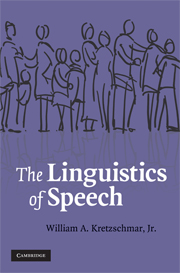Book contents
- Frontmatter
- Contents
- List of figures
- List of tables
- Acknowledgments
- The road not taken
- Introduction
- 1 The contemporary marketplace of ideas about language
- 2 Saussure
- 3 Evidence from linguistic survey research: basic description
- 4 Statistical evidence from linguistic survey research
- 5 Evidence from corpus linguistics
- 6 Speech as a complex system
- 7 Speech perception
- 8 Speech models and applications
- References
- Index
3 - Evidence from linguistic survey research: basic description
Published online by Cambridge University Press: 03 July 2009
- Frontmatter
- Contents
- List of figures
- List of tables
- Acknowledgments
- The road not taken
- Introduction
- 1 The contemporary marketplace of ideas about language
- 2 Saussure
- 3 Evidence from linguistic survey research: basic description
- 4 Statistical evidence from linguistic survey research
- 5 Evidence from corpus linguistics
- 6 Speech as a complex system
- 7 Speech perception
- 8 Speech models and applications
- References
- Index
Summary
Saussure found much of the primary evidence for his limited description of the linguistics of speech in the work of the first dialect geographers, Wenker and Gilliéron. This chapter will address evidence from more recent linguistic survey research. We can now carry out systematic research on speech that Saussure could not, using recording devices and computers and modern methods of statistics. If we use such modern methods to analyze survey research on linguistic features, we find that we get consistent, regular results, not just the anarchy of erratic distributions. These findings will lead to formulation in more detail of principles of regional and social organization of language at different levels of scale, within an overall linguistic continuum.
A good part of Saussure's resistance to the linguistics of speech came from the circumstances of language study in his day. He did insist on the necessity of speech for the establishment of a language ((1916)1986: 19):
it is by listening to others that we learn our native language. A language accumulates in our brain only as the result of countless experiences. Finally, it is speech which causes a language to evolve. The impressions received from listening to others modify our own linguistic habits.
Human beings have the capacity to manage their experience of speech, both to acquire a language originally and to continue to adjust language habits in light of continuing impressions from experience. However, the academic study of language is not the same as enactment of our human capacity for language.
- Type
- Chapter
- Information
- The Linguistics of Speech , pp. 64 - 103Publisher: Cambridge University PressPrint publication year: 2009

